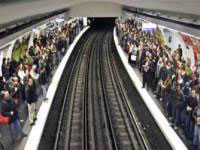Transport workers continue strikes in France
French transport workers stopped most rail traffic for a second full day. Passengers had to walk, bike and skate to work.

They faced the same fate for a third day after train and Paris subway workers voted to continue the open-ended strike. But an end appeared in sight after President Nicolas Sarkozy took up a union offer for talks while insisting that his contested plan to do away with special retirement benefits must remain intact.
"Our red lines are known. They haven't changed," presidential spokesman David Martinon said Thursday. However, he also said, "We are not pessimistic."
The walkouts eased Thursday, with more trains and subways running than on Wednesday, but not nearly enough to return a sense of normalcy to the rails. Employees of the Paris public transport system voted to continue the action Friday, and numerous unions said the SNCF train authority had done the same.
The strikes represent the first major union challenge to Sarkozy's plans to modernize France just as he marks six months in office. He made it clear Wednesday night that he wants the strikes to end "as quickly as possible."
Sarkozy agreed to an offer by the powerful CGT union for company by company talks in the presence of a government representative to find a solution. But he also said that the heart of the reform was not negotiable.
Sarkozy wants everyone to work 40 years to obtain full retirement benefits instead of the 37.5 years currently worked by privileged sectors, notably transport and utilities.
"I sincerely believe we have the possibility to get out of this with our heads held high," Labor Minister Xavier Bertrand said Thursday on RMC radio. Without tampering with the heart of the reform, there was still room for talks over "very precise" and "very concrete" issues, he said.
Bertrand, in a letter Wednesday night to seven union chiefs, said negotiations should commence "rapidly" and be completed in a month.
The government awaited a response from the half-dozen unions behind the strikes.
Software games designer Gilbert Benjamin is among those unhappy travelers who wants to see the government win the standoff.
"It's really a minority able to block 2 million people," Benjamin said after arriving in a packed train from the western suburbs to Paris' St. Lazare station.
"I want the time I lose to serve a purpose because each time it's always the same ones who win. It's those who strike who win," Benjamin said.
Both the state train authority, the SNCF, where workers began striking from Tuesday night, and the Paris transport system said conditions had improved somewhat Thursday the second full day of the walkout.
The SNCF said 150 fast trains out of 700 were running Thursday, compared with 90 the day before, while the RATP, which governs Paris public transport, said that three subway lines were virtually shut down while traffic varied on other lines, with an average of 80 percent of trains canceled.
The streets of Paris were clogged with pedestrians and those on bicycles making their way to the office.
Paring down the system of special retirement benefits is emblematic of Sarkozy's bid to do away with obsolete practices.
This was the second transport strike in less than a month. An Oct. 18 walkout more crippling than the current one was meant as no more than a warning. The current strike, with daily votes on whether to continue, was meant to wear the government down.
Subscribe to Pravda.Ru Telegram channel, Facebook, RSS!


